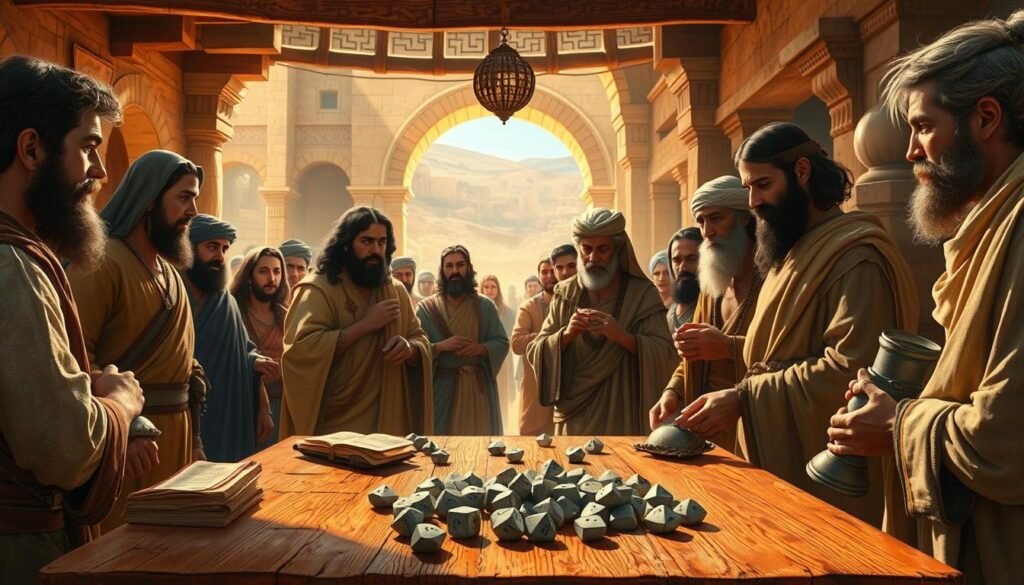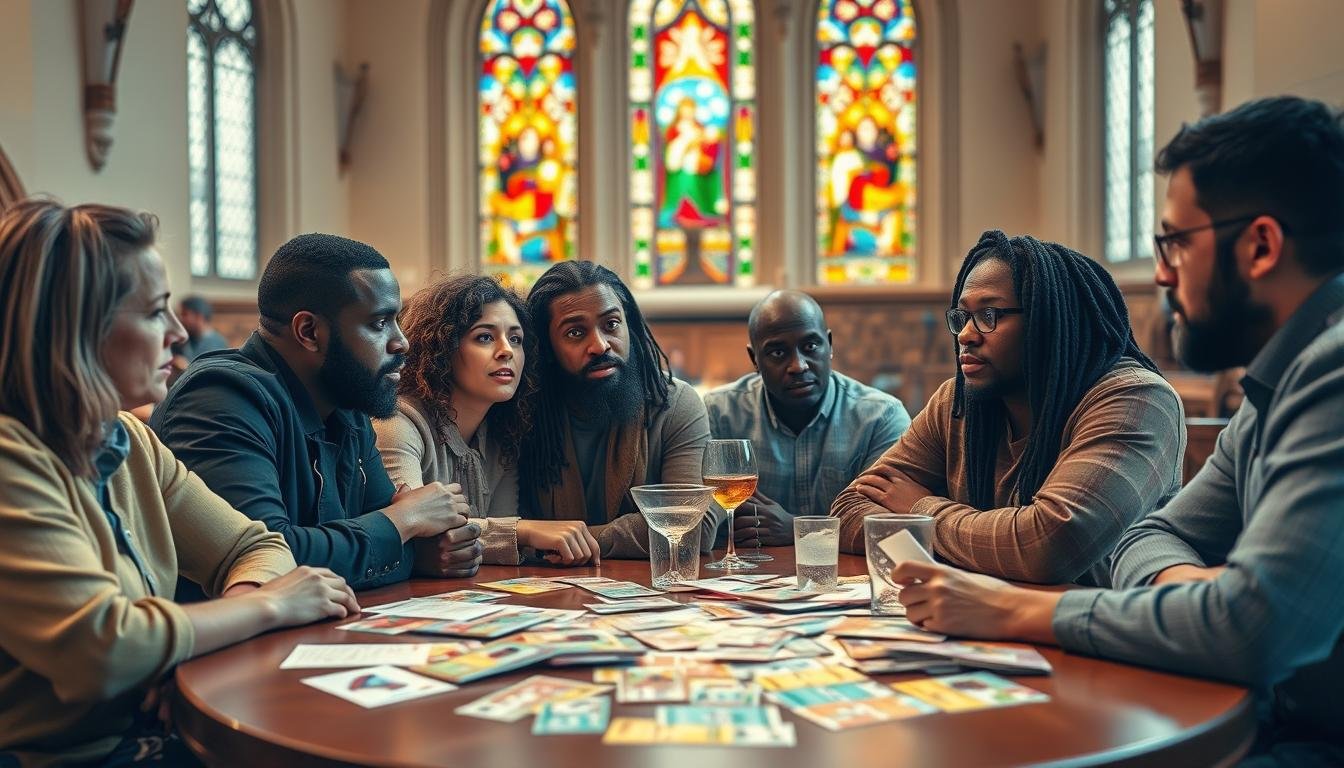Can Christians play the lottery and still follow their faith? This question brings up big talks about gambling, what the Bible says, and right and wrong in Christianity. In a world where some see the lottery as fun and others as a bad habit, we need to look at why people play and if it fits with Christian beliefs. We’ll look into what gambling and the lottery are, how they work, and their effects on society. This will help those unsure about playing the lottery make a choice that fits with their faith.
The Definition of Gambling
Gambling is about taking a risk on outcomes that are not in our control. It includes many activities, like betting on sports or playing the lottery. The lottery is a good example where people buy tickets hoping to win big, relying on luck.
At its heart, gambling is all about risk and chance. People know their success is not up to them. In the lottery, you might spend money hoping to win a big prize, but the chances are very low.
For Christians, thinking about gambling brings up big questions. It makes them think about what they value most. They must consider the risks and the role of luck in gambling.
Understanding the Lottery and Its Mechanics
The lottery is a fun way for people to buy tickets for a shot at big prizes. It uses random methods to pick winners, making it exciting. But, the odds of winning in big lotteries like Powerball are very low. They are often in the hundreds of millions to one.
Many players don’t think about the financial implications of buying lots of tickets. Spending a lot on tickets can be hard on people’s wallets. It’s important to know the true odds of winning before playing.
Even with huge jackpots, the lottery has its downsides. The thrill of games like Powerball doesn’t change the math behind winning. For those looking for guidance, checking out resources on godly wisdom might be helpful.
Can Christians Play The Lottery?
Lottery participation is a complex topic for Christians. It mixes faith with personal beliefs. There’s no direct ban on playing the lottery in the Bible. Yet, many Christians question its impact on their values and duties.
Some see playing the lottery as a sin. They believe it leads to gambling, which harms spiritual growth and finances. This makes people wonder, is it for fun or quick money?
Believers often think about how the lottery fits with their faith. They look at its effect on their families and communities. They use financial wisdom, making sure every choice matches their beliefs.
Looking at values and biblical teachings helps them decide. They might think about honesty and integrity in the Bible. For more on this, check out biblical insights.
At the end, Christians must make choices based on their faith. They balance their beliefs with what’s right for the community. This leads to deep talks among believers about the lottery’s place in their lives.
Biblical Examples of Gambling and Lottery
The Bible doesn’t directly talk about lotteries, but it does show biblical examples that are similar to gambling. For example, Samson made a bet and the soldiers cast lots for Jesus’ clothes. These stories show how chance and risk were part of life back then. They make us think about faith and trusting in God’s plan.
Proverbs 16:33 tells us that even when we make choices by chance, God is in control: “The lot is cast into the lap, but its every decision is from the Lord.” This verse reminds us that our choices, even if they seem random, are still guided by God. It teaches us to trust in faith, not just luck.

The Ethical Considerations of Playing the Lottery
Playing the lottery brings up many ethical thoughts, especially for Christians. It often hits those with less money harder than the rich. This makes us think about how it might exploit people financially. Those with little money might see the lottery as a way to get rich, but the chances are very low, leading to disappointment.
Thinking about joining the lottery means looking at its big effects on society. It’s seen as a quick way to make money, targeting those who are easily fooled. This raises big questions about right and wrong, beyond just the law. It’s about how it uses people’s dreams for its own gain.
Looking into the lottery’s ethics shows us a complex set of moral issues. Christians must think deeply about their choices. They need to balance their own dreams with the harm it might cause to others.
Personal Conviction and the Conscience
Deciding to play the lottery can lead to big moral dilemmas for many. At the heart of this is personal conviction, which guides our actions based on our beliefs. When thinking about playing the lottery, believers must check if it matches their Christian principles.
Scripture tells us to act by our conscience. Romans 14:23 says our actions should show our faith. This means we must think deeply about why we buy lottery tickets. We need to know if it’s for fun or if it goes against our beliefs.

Playing the lottery can make us feel many things and make us think about right and wrong. Christians might struggle between what they want and what they believe is right. This makes us think hard about what our choices really mean.
When we mix personal conviction and conscience, we must think carefully. Deciding to play the lottery should match our beliefs and Christian principles. For more on this topic, check out this article on Christian views on the lottery here.
The Impact of Lottery on Society
The lottery can have a big effect on society, especially on low-income people. Many spend money they can’t afford on lottery tickets. This leads to big financial problems for their families.
They use money meant for basic needs in hopes of winning. This can make poverty worse.
Studies show that poor communities often play the lottery more. This can keep them stuck in poverty. They gamble instead of planning for the future.
The dream of winning can make people ignore the low chances of winning.
Leaders should look closely at the lottery’s effects. They need to see how it hurts vulnerable groups. Understanding the money problems from playing the lottery could lead to new ways to fight poverty.
The Godly Perspective on Money and Wealth
Understanding how the Bible views wealth helps believers see important lessons on managing money well. Wealth is seen as both a tool and a test of character in the Bible. Christians are urged to handle their money wisely, seeing it as God’s gift.
Scripture teaches the importance of being financially smart. It says to work hard and manage money well. For example, Proverbs 21:20 talks about saving and budgeting. Luke 16:13 cautions against putting money above God.
This shows that wealth shouldn’t take over our lives. It’s important to focus on spiritual growth, not just making money. The Bible warns against wanting wealth too much.
It stresses the need to be generous and help others. This helps create a balanced view of money. By following God’s teachings, Christians can have a better relationship with money.

The Dangers of Get-Rich-Quick Schemes
Get-rich-quick schemes, like playing the lottery, promise quick wealth. But, they often lead to financial trouble instead. These schemes make people believe luck can beat hard work and smart money management. This takes away from the values of effort and persistence.
Such schemes also pull people away from the Bible’s teachings on honest work. In a world where managing money well is key, relying on lotteries and gambling is not wise. It’s important to see gambling for what it is: a risky choice that can harm your finances and spirit.
Knowing the risks of quick wealth ideas, especially through gambling, helps people make smarter choices. By choosing responsible money plans based on hard work and discipline, you can build a secure future. True wealth comes from dedication, faith, and following wise money rules.
FAQ
Can Christians Play The Lottery?
The Bible doesn’t directly say it’s wrong to play the lottery. But, Christians should think about their reasons and if it matches with what the Bible teaches about being responsible with money.
What does the Bible say about gambling?
The Bible doesn’t directly talk about gambling. But, it does mention things that look like gambling. It says God controls the results of our choices. This makes us think about if we’re relying on luck or faith and hard work.
Are lotteries fair for low-income individuals?
Many people who play the lottery are from low-income backgrounds. This raises questions about fairness. Lotteries might be seen as ways to quickly get rich, which could be harmful to those who are already struggling financially. Christians should think deeply about this.
How should Christians assess their conscience regarding lottery participation?
Christians should follow their conscience, as Romans 14:23 says. They should look at their reasons for playing the lottery. They should make sure it fits with their faith and values.
What are the societal consequences of playing the lottery?
Playing the lottery can lead to financial loss for players. It can also trap people in poverty by making them spend money they can’t afford. This money could be used for important things.
What biblical principles guide the view of money and wealth?
The Bible teaches us to work hard, manage our money wisely, and not to love wealth too much. Luke 16:13 warns us that we can’t serve both God and money. It tells us to focus on growing spiritually instead.
What are the risks associated with get-rich-quick schemes?
Schemes that promise quick wealth, like lotteries, often lead to financial trouble instead. They take people away from earning money honestly and wisely. They show the need for a faith-based approach to financial security.

Rockin’ the faith, one verse at a time!
Growing up, the Bible’s stories deeply impacted me. Now, with over 15 years of preaching experience, I blend timeless teachings with modern technology, making them relevant for today’s world.
Bible Hub Verse is my platform to share historical insights and thought-provoking articles, exploring both familiar and uncommon Christian topics. My passion is building a welcoming online space for everyone to learn, grow in their faith, and discover the Bible’s enduring message.
Join the journey!
God bless you.








